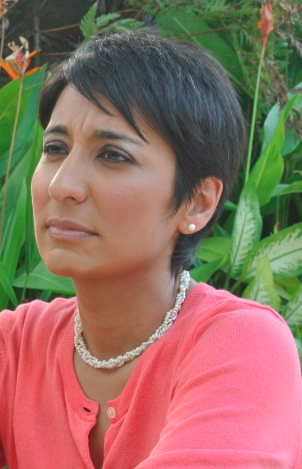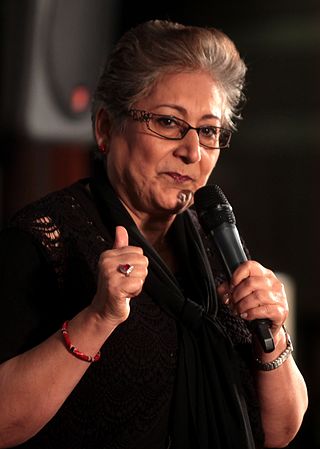Related Research Articles
Jihad is an Arabic word which literally means "striving" or "struggling", especially with a praiseworthy aim. In an Islamic context, it can refer to almost any effort to make personal and social life conform with God's guidance, such as struggle against one's evil inclinations, proselytizing, or efforts toward the moral betterment of the Muslim community (Ummah), though it is most frequently associated with war. In classical Islamic law (sharia), the term refers to armed struggle against unbelievers, while modernist Islamic scholars generally equate military jihad with defensive warfare. In Sufi circles, spiritual and moral jihad has been traditionally emphasized under the name of greater jihad. The term has gained additional attention in recent decades through its use by various insurgent Islamic extremist, militant Islamist, and terrorist individuals and organizations whose ideology is based on the Islamic notion of jihad.

Irshad Manji is a Ugandan-born Canadian educator. She is the author of The Trouble with Islam Today (2004) and Allah, Liberty and Love (2011), both of which have been banned in several Muslim countries. She also produced a PBS documentary in the America at a Crossroads series, titled Faith Without Fear, which was nominated for an Emmy Award in 2008. A former journalist and television presenter, Manji is an advocate of a reformist interpretation of Islam and a critic of literalist interpretations of the Qur'an.
Islamic terrorism refers to terrorist acts with religious motivations carried out by fundamentalist militant Islamists and Islamic extremists.

Jamaat-e-Islami, or Jamaat as it is commonly known, is an Islamist political party based in Pakistan and founded by Abul Ala Maududi. It is the Pakistani successor to Jamaat-e-Islami, which was founded in colonial India in 1941. Its objective is the transformation of Pakistan into an Islamic state, governed by Sharia law, through a gradual legal, and political process. JI strongly opposes capitalism, communism, liberalism, and secularism as well as economic practices such as offering bank interest. JI is a "vanguard party", whose members are intended to be leaders spreading party beliefs and influence. Supporters not thought qualified to be members may become "affiliates", and beneath them are "sympathizers". The party leader is called an ameer. Although it does not have a large popular following, the party is quite influential and considered one of the major Islamic movements in Pakistan, along with Deobandi and Barelvi.

Abdullah Yusuf Azzam was a Palestinian jihadist and theologian. Belonging to the Salafi movement within Sunni Islam, he and his family fled from what had been the Jordanian-annexed West Bank after the 1967 Arab–Israeli War and pursued higher education in Jordan and Egypt before relocating to Saudi Arabia. In 1979, Azzam issued a fatwa advocating for "defensive jihad" in light of the outbreak of the Soviet–Afghan War, and subsequently moved to Pakistan to support the Afghan mujahideen.
The Muslim Canadian Congress was organized to provide a voice to Muslims who support a "progressive, liberal, pluralistic, democratic, and secular society where everyone has the freedom of religion."

Tarek Fatah was a Pakistani-Canadian journalist and author. He was a Punjabi born into Islam and was a vocal critic of the Pakistani religious and political establishment, and the partition of India.

Yasir Qadhi is a Pakistani American theologian and Islamic scholar. He is dean of The Islamic Seminary of America and resident scholar of the East Plano Islamic Center in Plano, Texas. He was formerly the dean of AlMaghrib Institute and formerly taught in the Religious Studies department at Rhodes College in Memphis, Tennessee. He currently serves as the chairman of the Fiqh Council of North America.

A Jihad for Love is a 2008 documentary film and was the world's first film on Islam and homosexuality. It took a total of six years to make and premiered at the Toronto International Film Festival in September 2007. It premiered at the Berlin Film Festival in 2008 as the opening documentary film for the Panorama section.

Jihadism is a neologism for militant Islamic movements that are perceived as existentially threatening to the West. It has been applied to various insurgent Islamic extremist, militant Islamist, and terrorist individuals and organizations whose ideologies are based on the Islamic notion of jihad. It has also been applied to various Islamic empires in history, such as the Umayyad Caliphate and the Ottoman Empire, who extensively campaigned against non-Muslim nations in the name of jihad.
Riffat Hassan is a Pakistani-American theologian and a leading Islamic feminist scholar of the Qur'an.

Salafi jihadism, also known as revolutionary Salafism or jihadist Salafism, is a religious-political Sunni Islamist ideology, seeking to establish a global caliphate, characterized by the advocacy of "physical" (military) jihadist attacks on non-Muslim and (takfired) Muslim targets, and the Salafist interpretation of sacred Islamic texts, which they believe to be "in their most literal, traditional sense", to bring about the return to "true Islam".
Honour killings in Pakistan are known locally as karo-kari. According to the Human Rights Commission of Pakistan, over 470 cases of honour killings were reported in Pakistan in 2021. But human rights defenders estimate that around 1,000 women are killed in the name of honour every year. An honour killing is the homicide of a member of a family or social group by other members, due to the belief the victim has brought dishonour upon the family or community. The death of the victim is viewed as a way to restore the reputation and honour of the family.
Love jihad is an Islamophobic conspiracy theory promoted by right-wing Hindutva activists. The conspiracy theory purports that Muslim men target Hindu women for conversion to Islam by means such as seduction, feigning love, deception, kidnapping, and marriage, as part of a broader demographic "war" by Muslims against India, and an organised international conspiracy, for domination through demographic growth and replacement.

Raheel Raza is a Pakistani-Canadian journalist, author, public speaker, media consultant, anti-racism activist, and interfaith discussion leader. She is among the most prominent Muslim supporters of Israel. She lives in Toronto, Ontario, Canada.
The use of politically and religiously-motivated violence dates back to the early history of Islam, its origins are found in the behavior, sayings, and rulings of the Islamic prophet Muhammad, his companions, and the first caliphs in the 7th, 8th, and 9th centuries CE. Mainstream Islamic law stipulates detailed regulations for the use of violence, including corporal and capital punishment, as well as regulations on how, when, and whom to wage war against.
From the time of Muhammad, the final prophet of Islam, many Muslim states and empires have been involved in warfare. The concept of jihad, the religious duty to struggle, has long been associated with struggles for promoting a religion, although some observers refer to such struggle as "the lesser jihad" by comparison with inner spiritual striving. Islamic jurisprudence on war differentiates between illegitimate and legitimate warfare and prescribes proper and improper conduct by combatants. Numerous conquest wars as well as armed anti-colonial military campaigns were waged as jihads.

Akhundzada Mohammad Abdul Ghafoor Hazarvi was a Muslim theologian, jurist, and scholar of ahadith in Pakistan. He was active in the Pakistan movement, member of Council of Islamic Ideology. He was the companion of Muhammad Ali Jinnah and separatist leader Maulana Zafar Ali Khan and was active in the independence movement of Pakistan against the British Raj. He was a Sufi of the Chishti Sufi order and the founding member of the religious Barelvi Sunni strain political party Jamiat Ulema-e-Pakistan (JUP). He became its president in 1948. He was also a political figure in Pakistan and was the first recipient of Nishan-e-Imtiaz by the President of Pakistan. He was also the chairman of Majlis-e-Tahaffuz-e-Khatme Nabuwwat, an organisation opposed to the Ahmadiyya Movement that waged a campaign against Mirza Ghulam Ahmed's claim of prophethood.
Feminism in Pakistan refers to the set of movements which aim to define, establish, and defend the rights of women in Pakistan.This may involve the pursuit of equal political, economic, and social rights, alongside equal opportunity. These movements have historically been shaped in response to national and global reconfiguration of power, including colonialism, nationalism, Islamization, dictatorship, democracy, and the War on Terror. The relationship between the women's movement and the Pakistani state has undergone significant shifts from mutual accommodation to confrontation and conflict.
Ex-Muslims are people who were raised as Muslims or converted to Islam and later left the religion of Islam. Challenges come from the conditions and history of Islam, Islamic culture and jurisprudence, and sometimes local Muslim culture. This has led to increasingly organized literary and social activism by ex-Muslims, and the development of mutual support networks and organizations to meet the challenges of abandoning the beliefs and practices of Islam and to raise awareness of human rights abuses suffered by ex-Muslims.
References
- ↑ Munn, Sarah. "Pakistani-born Canadian author Farzana Hassan on inequality of women". Canadian Immigrant . Retrieved 24 September 2014.
- ↑ Smith, Charlie (17 April 2011). "Farzana Hassan lecture at UBC generates backlash from B.C. Muslim Association representative". straight.com . Retrieved 24 September 2014.
- ↑ "Farzana Hassan". Toronto Sun. Retrieved 2019-02-04.
- ↑ "About Farzana" . Retrieved 24 September 2014.
- ↑ Shahid, Farzana Hassan; Hassan, Farzana (2006). Islam, Women and the Challenges of Today. White Knight Books. ISBN 9780978057022 . Retrieved 2019-02-04.
- ↑ Shahid, Farzana Hassan (2012). Unveiled. Freedom Press. ISBN 9780988169159 . Retrieved 2019-02-04.
- ↑ Hassan, Farzana (11 September 2018). The Case Against Jihad. Mantua Books Limited. ISBN 9781927618097 . Retrieved 2019-02-04.